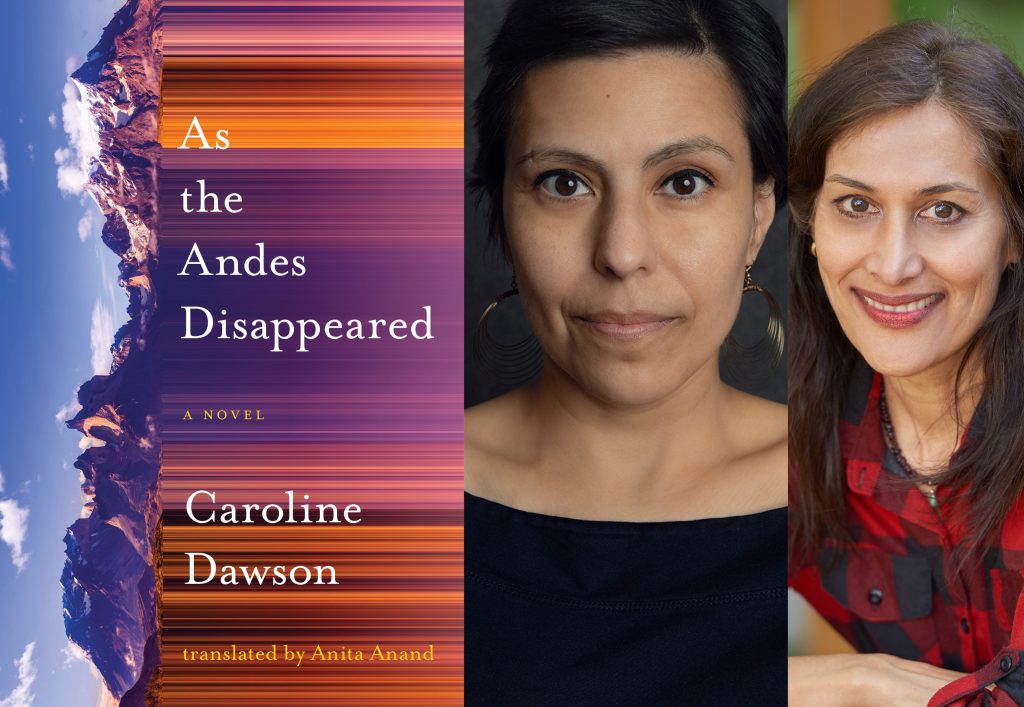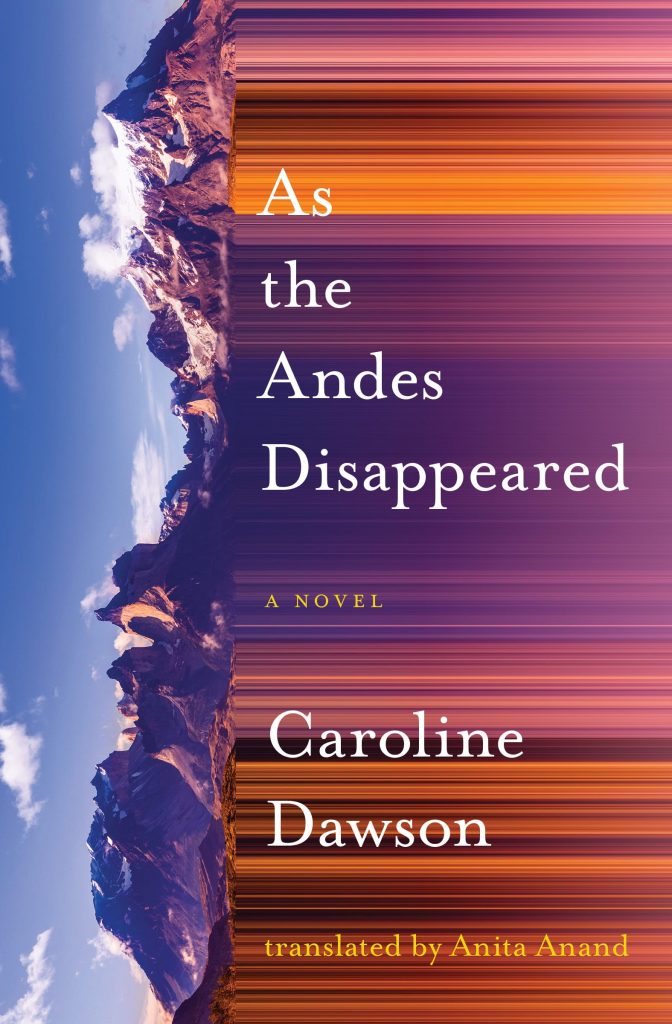Fall 2023 Fiction Preview: As the Andes Disappeared by Caroline Dawson, translated by Anita Anand

Today’s Fall Fiction Preview features As the Andes Disappeared by Caroline Dawson, translated by Anita Anand!
Caroline is seven when her family flees Pinochet’s regime, leaving Chile for Montreal on Christmas Eve, 1986. She fears Santa won’t find them on the plane but wakes to find a new Barbie at her side, her mother preserving the holiday even amidst persecution and turmoil. It’s a symbol of care repeated throughout the relocation as her parents work tirelessly to provide the family with a new vision of the future.
Once in Canada, Caroline accompanies her parents as they clean banks at night; she experiences racist micro-aggressions at school, discovers Québécois popular culture, and explores her love of reading and writing in French. Slowly, the Andean peaks disappear from her drawings. As her family increases their wealth and status—moving to a better apartment every six months in Montreal’s working-class east-end neighbourhood and then a house in the suburbs—the fracture between her parents’ identity and her own grows. When Caroline realizes an apartment she’s partying in is one her mother cleans, the division between her parents’ life and her own becomes explicitly clear.
This expansive coming-of-age autobiographical novel probes the plurality of identity, elucidating the interwoven complexities of immigrating to a new country. As the Andes Disappeared tenderly reflects the journey of millions and is a beautiful ode to family commitment and the importance of home—however layered that may be.
“This beautiful, poetic book vividly captures an immigrant experience that drew me in from the very first sentence to the very last. As an immigrant myself, I saw my own experiences mirrored similarly. I’m so grateful to have read this and I hope you will, too,” writes Hasan Namir, author of Umbilical Cord and War/Torn.
We’ve also selected an excerpt from the novel to share with you today. As the Andes Disappeared will be released on November 14, 2023, and is available for pre-order from our online shop or from your local independent bookstore.

The first time I decided not to kill myself, I was seven years old.
It was summer in the Southern hemisphere in December 1986. In Valparaiso, the land of sandy dust that infiltrates old, poorly insulated stone houses and sticks to all the furniture. Our house stood—I’m not sure how—on one of the hundreds of slopes of one the of dozens of hills in one of Chile’s big cities. It seemed unstable and rickety, and yet it resisted each earthquake which regularly shook it and all the other crappy houses in our poor neighbourhood. It moved in sync with the Earth itself, and I with it.
I whirled around on the top floor, the only one that let in a little light. Our house was old, dim, and shabby, like all the others on the steep hill we called our street. The ocean wind knocked at the windows, snuck inside even when everything was shut. My parents called me from their bedroom, had me join them on the gigantic ocean liner they used as a bed. It was probably just a queen, but to my young eyes, it was an enormous island. The soft light of dawn on the white sheets, the warmth of their still sleepy bodies, the lovely languor of early morning: it was bliss, lying there between them. I rolled from one side to the other, seeking attention. Until they grew subdued and said those sharp, stark words that divided time into a before and an after, a past and a future. They announced their decision, and I froze, time stood still, the future was suspended. A pivotal moment, words like blades, like an axe splitting a log.
I don’t know what those words were. They’ve been obliterated, as have almost all my memories of the country where I was born. And yet, I did spend a good part of my childhood in Chile. It’s where I first went to school, learned to read and write with words like mi mamá [1], loved my family and my friends. Like all Chileans, I played with my balero [2], my trompo [3], with kites made from old newspaper. My life was carefree and happy despite the disappearances, detentions, tortures, and concentration camps of which I’d heard nothing more than murmurs, half-spoken whispers. I spent seven years under a dictatorship in a divided, unstable country and I barely remember anything apart from this turning point in our lives. That moment and then everything that followed it.
They told me that in a few days we would leave the country to seek refuge in Canada—forever. Fear seized me then, in the same place it sometimes still does, in my stomach. Stunned by the immutability of this decision, I didn’t say a word, didn’t ask a single question. I was clearly aware of the seriousness of this moment and of my complete powerlessness to change anything. I looked at my pudgy hands and wondered if Canadian children also had dirt under their fingernails or if everything over there was immaculate.
[1] My mother.
[2] A game with a cup on top of a stick attached to a ball on a string.
[3] Chilean spinning top
Caroline Dawson was born in Chile in 1979 and immigrated to Quebec with her family when she was seven. As the Andes Disappeared, originally published in French as Là où je me terre (2020), was a finalist for various prizes, including the Prix des libraires du Quebec and Radio Canada’s Combat national des livres, and won the Prix littéraire des Collégiens and the Prix AIEQ. She is also the author of the poetry collection, Ce qui est tu (2023). Dawson teaches sociology and co-organizes the Montreal Youth Literature Festival. She lives in Montreal.
Anita Anand is an author, translator and language teacher from Montreal. She is the author of Swing in the House and Other Stories, which won the 2015 Concordia University First Book Prize and was shortlisted for the 2016 Relit Award for Fiction and the Montreal Literary Diversity Prize. Her novel, A Convergence of Solitudes, was nominated for the 2022 Paragraphe Hugh MacLennan Prize for Fiction and the 2023 Forest of Reading Evergreen Award. Her previous translations include Nirliit by Juliana Léveillé-Trudel, which was nominated for the 2018 John Glassco Prize, and Lightness by Fanie Demeule.

